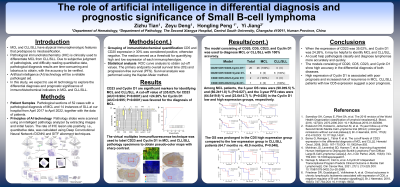Category: General Abstract
1013 - The role of artificial intelligence in differential diagnosis and prognostic significance of Small B-cell lymphoma

Objective To obtain quantitative pathological immunohistochemistry (IHC) data using artificial intelligence (AI) technology to investigate the differential diagnosis and prognostic significance of immunophenotypic expression in MCL and CLL/SLL. Methods Retrospective collection of pathological sections of 52 cases with a pathological diagnosis of MCL and 14 instances of SLL at our hospital from April 2017 to April 2022, together with the data of patients. The Kaplan-Meier method was used for survival function estimation. Results A cut-off value of ≤35.02% for CD23 (AUC=0.904; P < 0.0001) and >24.26% for Cyclin D1 (AUC=0.995; P < 0.0001) was favored for the diagnosis of MCL. The model consisting of CD20, CD5, CD23, and Cyclin D1 was used to diagnose MCL or CLL/SLL with 100% accuracy. Among MCL patients, the 3-year overall survival (OS) rates were (90.0±9.5) % and (60.2±11.8) % (P=0.027), and the 3-year progression-free survival (PFS)rates were (64.5±19.9) % and (23.6±12.7) % (P=0.026) in the Cyclin D1 low and high expression groups, respectively. The OS was prolonged in the CD5 high expression group compared to the low expression group in SLL patients (64.7 months vs. 48.0 months, P=0.048). Conclusion The application of AI in IHC helps to identify MCL and CLL/SLL more accurately and efficiently. The newly identified risk factors are expected to guide better the treatment and prognosis of MCL and CLL/SLL.
- ZT
Zizhu Tian, Master
Changsha
- HP
Hongling Peng, Dr
Department of Hematology, The Second Xiangya Hospital, Central South University
Changsha, China (People's Republic) - yj
yi jiang, Dr
changsha
- zd
zeyu deng, Dr
changsha

